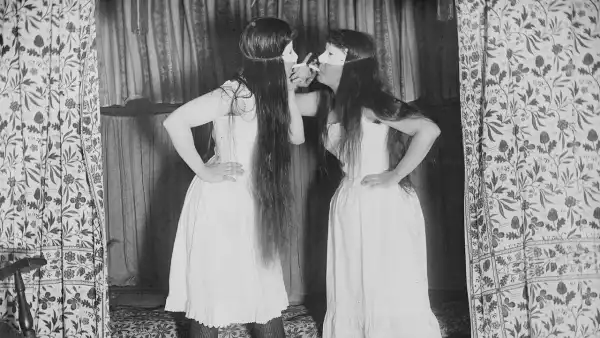
Save this storySave this storySave this storySave this story
You almost forget that Elisabeth Moss can smile. The lead actress of Hulu’s The Handmaid’s Tale, now in its sixth and final season, spent much of her screen time contorting her face in grief as June Osborne, one of the handmaids who are imprisoned, ritually raped, and forced to bear children in the show’s world, where America has been taken over by a dystopian theocratic regime called Gilead. Moss’s eyebrows would rise in horrified pleading as she begged various Gilead functionaries for mercy, secrecy, or help in escaping. Her mouth would contort in horror and rage as she was subjected to the order’s inventive and brutal punishments, which the show depicted in grisly scenes in which women suffered amputations, eye gouging, scorching, shackling, whipping, genital mutilation, drowning, hanging, and being thrown off rooftops. Her jaw quivered with shock and exhaustion as she watched her comrades being captured, tortured, and killed.
As the series progressed, with June eventually escaping Gilead and becoming the leader of a rebel group seeking to overthrow the regime, Moss increasingly wore an expression of fierce determination: smooth forehead; firm, direct gaze; tense jaw. The Handmaid’s Tale has been airing since 2017, and Moss’s personality sometimes seems to have merged with her character. Whether the actress is politely chatting with an interviewer or leaning into an outstretched microphone on the red carpet, it’s almost uncanny to see her happy and at ease after so many years of playing a woman in extreme situations.
If Moss seems out of place outside of The Handmaid’s Tale, it may be because the show has, for better or worse, become emblematic of an era. The show benefited from unusually good timing: Its first season premiered just five months after Donald Trump’s first election, and it quickly gained popularity by representing what liberal Americans, and especially liberal women, feared about a future Trump. Women began showing up at anti-Trump protests in costumes inspired by the show—the Handmaids’ long red capes and crisp white hats became symbols of their political discontent. The 10-episode first season quickly passed its source material, the 1985 novel by Canadian author Margaret Atwood, but the show kept getting renewed.
Nearly a decade after its premiere, Handmaiden retains its signature brutality, but it has exhausted its narrative premises. Characters routinely make choices that don’t align with their values or motivations, and return to relationships — and places — that have long since exhausted their potential. As has been the case since the first season, much of the plot hinges on June’s magnetic attraction to Nick, the Gilead driver-turned-Commander played by the charmless Max Minghella, a guarded and opaque character who seems incapable of inspiring the self-destructive devotion the story demands of him. The writing, now a far cry from the original book, is marked by the familiar laziness of late-season TV writers, who drag their feet. (One particularly irritating bit of dialogue, when two characters discuss the aftermath of a massacre, devolves into them arguing about whether anyone is hotter than Rihanna.)
The writers' biggest challenge is finding reasons to keep Moss's character in Gilead. In the early seasons, June repeatedly refuses to leave the country when given the chance; after she finally escapes to Canada in Season 4, the writers have to come up with new ways to bring her back. As Season 6 begins, growing anti-refugee and pro-Gilead sentiment in June's adopted home of Toronto forces her to head west with Nicole, the infant daughter she gave birth to in Season 2, to an American refugee camp in Alaska. (In the show, Alaska and Hawaii are the only two former U.S. states not captured by Gilead; the flag flies two tiny stars.) An excuse quickly arises to bring June back to Gilead: She learns that her best friend, former handmaiden Moira (Samira Wiley), and her husband Luke (English actor O.T. Fagbenle, taking the show’s grim material more seriously than it deserves), are planning to lead a rebel operation into Gilead territory. Fearing for her safety, June decides to stop them. Inevitably, she joins their efforts instead. Soon, June finds herself back in Gilead, and once again wearing her now-infamous red robe.
Atwood, writing in the Reagan years, imagined an authoritarianism of a repressive Christian kind. The sexual politics of conservatives in our era are more prurient and crude: the misogynists of Gilead say, “Blessed be the fruit”; ours say, “Grab 'em by the pussy.” Yet
Sourse: newyorker.com






